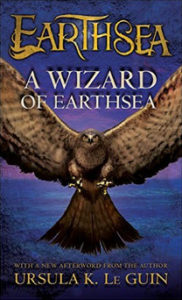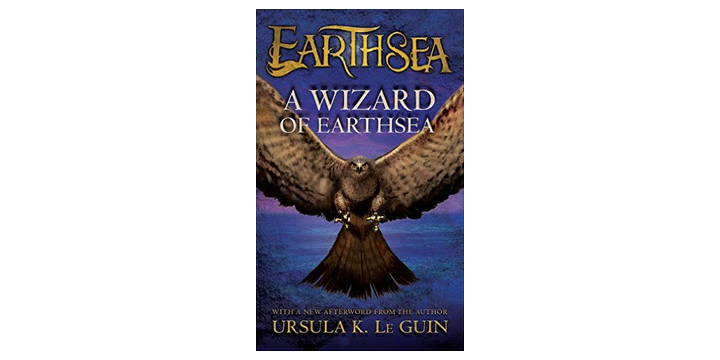 Earthsea’s approach to magic deeply intrigued me. Like most human beings I find the idea of magic fascinating. To be able to wave my hand or a wand, say a word, and have what I want to happen is a very seductive daydream. However, I find that it usually accompanied by a bitter aftertaste. The bitterness stems from where magic meets reality. Rarely are there any solid attempts (or any attempts at all) to explain how magic works, what rules there are to using it, and the consequences of using it. While I can read books that involve magic, and enjoy them, I have a greater appreciation for those books where the author treats the magic as more than mere entertainment for the reader. Usula Le Guin does a remarkable job in A Wizard of Earthsea: Book 1.
Earthsea’s approach to magic deeply intrigued me. Like most human beings I find the idea of magic fascinating. To be able to wave my hand or a wand, say a word, and have what I want to happen is a very seductive daydream. However, I find that it usually accompanied by a bitter aftertaste. The bitterness stems from where magic meets reality. Rarely are there any solid attempts (or any attempts at all) to explain how magic works, what rules there are to using it, and the consequences of using it. While I can read books that involve magic, and enjoy them, I have a greater appreciation for those books where the author treats the magic as more than mere entertainment for the reader. Usula Le Guin does a remarkable job in A Wizard of Earthsea: Book 1.
Instead of giving in to the readers’ magical fantasies by having her hero use fantastic powers in battle for the purposes of shock and awe, she moves the opposite direction. We see little magic from Ged throughout the book even though one powerful wizard has foreseen that Ged will become the most powerful among them. Unlike Harry Potter where magic is used at every turn for the delight of the reader, Le Guin shows magic sparingly even though her world is full of it. For me that is a refreshing twist.
Ironically Ged, when he learns he has a propensity for magic, dreams like any of us would of all the things he will do with his magic when he learns how to use it. The day comes when a wizard takes him on as an apprentice. Ogion subtly showed great power by easily bringing Ged back from a near-death state that had been brought on by Ged’s overextending what little power he then had to save his village from attackers.
Ged is soon disappointed by this Ogion’s hesitancy to use magic. He won’t even use it to stop the rain so that they can sleep dry while traveling through the forest.
But Ogion let the rain fall where it would. He found a thick fir-tree and lay down beneath it. Ged crouched among the dripping bushes wet and sullen, and wondered what was the good of having power if you were too wise to use it, and wished he had gone as prentice to that old weatherworker of the Vale, where at least he would have slept dry.
I was impressed by Le Guin’s responsible approach toward magic. I was happy at how she carried out this restraint throughout the book, successfully using the restraint to keep my attention and not boring me.
Ged is unhappy with his tutelage by Ogion as it seems nothing more than learning how to live with nature. He doesn’t understand, or perhaps he just doesn’t have enough patience, to accept that this oneness with nature is the source of Ogion’s great power. Even after seeing a terrifying display of Ogion’s power, once more to save Ged’s life:
The door was flung wide. A man entered with a white light flaming about him, a great bright figure who spoke aloud, fiercely and suddenly. The darkness and the whispering ceased and were dispelled.
Ged jumps at the chance to leave his apprenticeship under Ogion and go to the great wizarding school on the island of Roke.
But even on Roke, where Ged excels in his studies, the wizards, masters of magic, teach restraint in using it. I found I bought in wholeheartedly to Le Guin’s magical philosophy taught through these wizards.
To change this rock into a jewel, you must change its true name. And to do that, my son, even to so small a scrap of the world, is to change the world . . . To light a candle is to cast a shadow.
Yes! A world of magic that has teeth. Using magic in this world has consequences.
Ged progresses in magic faster than he is emotionally mature and this, of course, leads to the conflict. Through pride and carelessness he calls something into the world that has no name and thus cannot be controlled by any wizard, let alone the young Ged. The rest of the book is about Ged surviving while learning how to face this dark power he has unleashed.
Ged, a young wizard who gets little respect and who is struggling for his life still lives as a hero. While confronting a dragon, and very possibly death, Ged is given a great temptation. The dragon, in a bid to save itself has a proposition:
“Yet I could help you. You will need help soon, against that which hunts you in the dark.”
Ged stood dumb.
“What is it that hunts you? Name it to me. . . . If you could name it you could master it, maybe, little wizard. Maybe I could tell you its name, when I see it close by. And it will come close, if you wait about my isle.”
If Ged makes the deal he may save himself, but at the cost of the village who has hired him to save them.
Le Guin’s book reads like most novels you’ve read, but in tone it feels like a story being told around a campfire.
So bolstering up his pride, he set all his strong will in the work they gave him, the lessons and crafts and histories and skills taught by the grey-cloaked masters of Roke, who were called the Nine.
The world she creates has great detail while at the same time displaying a sparseness that a story of the oral tradition might have. This bothered me a little, falling short of the Tolkien complexity of details, and yet intrigued me as a legitimate, polished style she consciously chose.
If you are a serious fan of fantasy, but haven’t read A Wizard of Earthsea, you ought to. You may not like Le Guin’s style as opposed to how writers are writing today, but it is serious book, very readable, that will give good contrast to the other books of magic you may come across and make your reading experiences more pleasurable.

